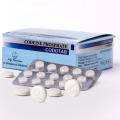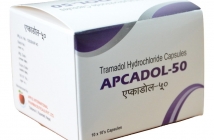Home / Categories / CODOPHOS-15MG

CODOPHOS-15MG
(10)
CODEINE PHOSPHATE 15MG
OPOID DERIVATIVES
VIJAYADEEP LABORATORIES LTD
Product Details
Codeine
A to Z Drug Facts
Codeine
Action
Indications
Contraindications
Route/Dosage
Interactions
Lab Test Interferences
Adverse Reactions
PrecautionsPatient Care Considerations
Administration/Storage
Assessment/Interventions
Patient/Family Education
(KOE-deen)Available as generic onlyClass: Narcotic analgesic/Antitussive
 Action Stimulates opiate receptors in the CNS; also causes respiratory depression, peripheral vasodilation, inhibition of intestinal peristalsis, stimulation of the chemoreceptors that cause vomiting, increased bladder tone and suppression of cough reflex.
Action Stimulates opiate receptors in the CNS; also causes respiratory depression, peripheral vasodilation, inhibition of intestinal peristalsis, stimulation of the chemoreceptors that cause vomiting, increased bladder tone and suppression of cough reflex.
 Indications Relief of mild to moderate pain; cough suppression.
Indications Relief of mild to moderate pain; cough suppression.
 Contraindications Hypersensitivity to opiates; upper airway obstruction; respiratory compromise; acute asthma; diarrhea caused by poisoning or toxins.
Contraindications Hypersensitivity to opiates; upper airway obstruction; respiratory compromise; acute asthma; diarrhea caused by poisoning or toxins.
 Route/Dosage
Route/Dosage
ANALGESIC
ADULTS: IM/slow IV/PO/SC 15–60 mg q 4–6 hr (maximum 360 mg/day). CHILDREN (³ 1 YR): IM/PO/SC 0.5 mg/kg q 4–6 hr.
ANTITUSSIVE
ADULTS PO 10–20 mg q 4–6 hr (maximum 120 mg/day). CHILDREN (6–12 YR): PO 5–10 mg q 4–6 hr (maximum 60 mg/day). CHILDREN (2–6 YR): PO 2.5–5 mg q 4–6 hr (maximum 30 mg/day).
 Interactions
Interactions
CNS depressants, (eg, tranquilizers, sedatives and alcohol): Causes additive CNS depression.
 Lab Test Interferences Amylase and lipase determination: Increased levels for up to 24 hr after administration.
Lab Test Interferences Amylase and lipase determination: Increased levels for up to 24 hr after administration.
 Adverse Reactions
Adverse Reactions
CV: Hypotension; orthostatic hypotension; bradycardia; tachycardia; shock. CNS: Lightheadedness; dizziness; sedation; disorientation; incoordination; euphoria; delirium. DERM: Sweating; pruritus; urticaria. EENT: Miosis. GI: Nausea; vomiting; constipation; abdominal pain; anorexia; biliary tract spasm. GU: Urinary retention or hesitancy. RESP: Laryngospasm; depression of cough reflex; respiratory depression. OTHER: Tolerance; psychological and physical dependence with chronic use.
 Precautions
Precautions
Pregnancy: Category C. Therapeutic doses of codeine have increased duration of labor. Lactation: Excreted in breast milk. Children: Do not give IV to children < 12 yr. Children are more sensitive to effects of drug. Elderly patients: More sensitive to effects of drug. Special risk patients: Use with caution in patients with myxedema, acute alcoholism, history of drug abuse potential, acute abdominal conditions, ulcerative colitis, decreased respiratory reserve, head injury or increased intracranial pressure, hypoxia, supraventricular tachycardia, depleted blood volume, circulatory shock, hypothyroidism, and urinary/bowel elimination problems. Dependency: Codeine has abuse potential. Renal or hepatic impairment: Duration of action may be prolonged; may need to reduce dose.
PATIENT CARE CONSIDERATIONS
 Administration/Storage
Administration/Storage
- Administer oral medication with food or milk to avoid GI irritation.
- Protect injectable forms from excessive exposure to light.
- Codeine is two thirds as effective given orally as parenterally.
 Assessment/Interventions
Assessment/Interventions
- Obtain patient history, including drug history and any known allergies. Patients with sulfite sensitivity have increased risk of allergy with certain injectable codeine products.
- Assess degree of pain before and after administration.
- Monitor pulmonary status and heart rhythm after administration.
- Monitor bowel movements and inform physician of significant pattern change.
- If respiratory compromise or increased sedation develop, withhold medication and notify physician.
OVERDOSAGE: SIGNS & SYMPTOMS Miosis, respiratory and CNS depression, circulatory collapse, seizures, cardiopulmonary arrest, death
 Patient/Family Education
Patient/Family Education
- Instruct patient on self-assessment of pain and on how and when to administer medication.
- Advise patient to increase fluid intake to relieve constipation and to take stool softener or mild laxative as needed.
- Advise patient to take medication with food if GI upset occurs and to monitor for GI irritation.
- Explain that codeine may be habit forming.
- Caution patient to avoid sudden position changes to prevent orthostatic hypotension.
- Instruct patient to avoid intake of alcoholic beverages or other CNS depressants.
- Advise patient that drug may cause drowsiness and to use caution while driving or performing other tasks requiring mental alertness.
- Instruct patient not to take otc medications without contacting physician.
Books@Ovid
Copyright © 2003 Facts and Comparisons
David S. Tatro
A to Z Drug Facts
Substitutes




